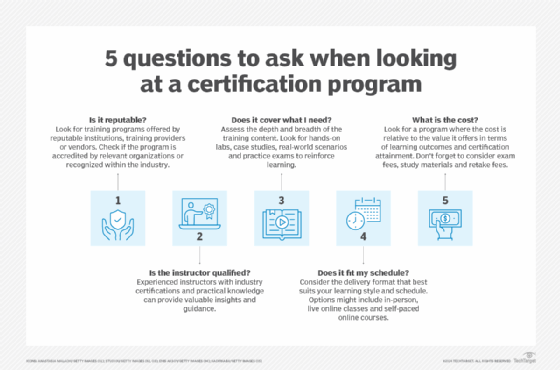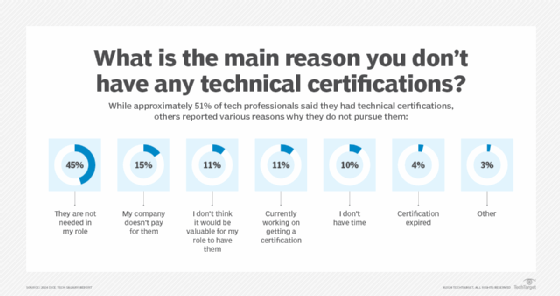
svetazi - stock.adobe.com
How to evaluate cloud certification training
Certifications and training courses help IT pros acquire the knowledge and skills to succeed in cloud. Learn what to look for in courses and how to choose the right program.
Certifications are a staple of the IT industry, typically broken down by roles or technology. Certifications for networking, operating systems and virtualization are all commonplace. However, the world of certifications has changed due to cloud computing, so you need to be prepared to adapt.
Certifications tend to fall into two different groups: vendor-sponsored and vendor-agnostic. Both have their place, but you'll need to continually assess your options to stay on top of the evolving cloud landscape. Doing so can help you in your current role or set you up to get the job you really want, such as a cloud architect or engineer.
Find out how to select a cloud certification training program that aligns with your learning preferences, career objectives and budget.
How do I find the right cloud training program?
With the exponential growth of cloud usage, it's no surprise that cloud training is big business as a revenue generator. A simple search will find lists of online and boot camp offerings with guaranteed promises of passing cloud certifications. Let's review some key areas learners should explore.
Courses
When selecting a course, look at the company's reviews and history. A company with a history of training has more credibility than one that started up a year ago. Look at the staff and their certifications, as well as vendor partnerships. Most companies are forthcoming in advertising partnerships, pass rates and success of former students because it is a huge marketing push. If there are no reviews and testimonials, it is a red flag.
When it comes to passing the certification exam, is the class an exam prep or a class to help you learn the technology in question? Ideally, you want a class that does both. A good educational vendor will ensure you learn the technology, give helpful tips on passing the exam and encourage networking with classmates. Certification boot camps are designed to help you get certified -- they do not focus on product knowledge, which makes some more of a cash grab than you might expect.

Instructors
Look for instructors that are certified in the technology they are teaching. Also, make sure they didn't just get certified with no practical, hands-on or teaching experience. Real-world experience, in addition to general cloud skills, with the technology is also desirable. LinkedIn is a good place to find out this information. However, there are a few caveats to this.
It's okay to have someone new to the technology if they are a seasoned instructor. What you don't want is a technical expert who has never taught anyone before. That will always end in a disaster -- you want someone who knows the technology and the ability to actually explain it so people can understand it. That is why teachers are teachers and not simply subject matter experts; the delivery and absorption are key.
Delivery options
When it comes to the delivery options, it can be more of a personal preference. Online options are heavily favored over in-person delivery options. The transition to online classrooms has continued to gain focus but in-person classes still have value. However, one of the great benefits of being in person is you often connect with fellow students which can help build a sense of community. This can go a long way both personally and professionally. However, in-person classes can mean travel and hotel costs.
When it comes to online offerings, virtual live classrooms cannot be done at the office or home if you have people around. You should isolate yourself to get the most out of the training as possible. Most of these live courses will be a mixture of lectures and labs, so you will need to be attentive. When it comes to pure online recorded lectures, they are on-demand or self-paced so there is a bit more freedom. You want to avoid classes that do not have labs, you need to get into the cloud interfaces to see what you are learning about and gain hands-on experience.
Pricing
Cost and value always come into play as well when any discussion about training comes up. Training is not cheap, vendor-provided training can be thousands of dollars for a course. When it comes to training, you get what you pay for and pricing can vary widely. Sure, some free video streams can have great content but when you miss the interaction with the instructor or hands-on labs, you lose the chance to ask a question or get more details.
What type of certifications should I get?
While an Amazon Web Services certification is ideal for a business that uses AWS' cloud platform, it falls flat if your company uses Microsoft Azure. Sure, some of the basic concepts are the same, but the major clouds have unique dashboards, interfaces and features. That doesn't mean the certification is a waste of time, but it won't have the same impact it might have had in the past.
Take the VMware certification as an example. Several years ago, it was the only certification you needed to get for virtualization. But that changed as the market evolved and other players emerged. Today, a VMware certification is still valuable, but its value changes depending on what your company uses. The same goes for cloud.
AWS and Microsoft are the biggest players when it comes to cloud certification training. They each have multiple levels of certifications, which typically start at fundamental or foundational exams, then advance to associate and professional levels.
Take a multi-cloud approach
The typical school of thought for certifications has always been that you become a more valuable resource as you reach higher levels -- but the cloud is different. Many companies use multiple cloud vendors, based on where services are the most ideal. The one-stop vendor shop simply doesn't exist in IT anymore and that has a direct impact on your approach to certifications.
For example, even if your company does all its development work in AWS, it probably also has an Azure presence for Office 365. It might just be a SaaS-based involvement, but it's still there. So, if you only have an AWS certification, you're not accounting for your actual business needs.
Expert-level certifications might have been ideal in the past, but now you might want to reconsider your approach to grow your cloud skills. Instead of training to master a single vendor's certification exams, look at lower-level certifications for multiple vendors. Passing an expert exam for Azure might be impressive, but the same can be said about getting associate-level certifications for Azure, AWS and Google Cloud. That variety showcases your ability to adapt. And given the rate of change in cloud computing, that's a good thing.
Of course, the downside to this multi-cloud approach is that you'll need to maintain three different certifications, each with its own renewal timeframe and exam cost. Yet, the impact of having multiple certifications cannot be undersold. Even if your current team or employer doesn't use one of the vendors, your next job might. In fact, it might be one of the main reasons you land that job. It all comes down to matching your certifications to a company's needs.
Consider vendor-agnostic certifications
Vendor-specific certifications certainly have their value, but they're also more likely to be marketing-driven, emphasizing a sales pitch over technical content. The alternative is vendor-agnostic certifications, such as the CompTIA Cloud+ or the Certified Cloud Security Professional (CCSP).
With vendor-agnostic certifications, remember the target audience for each program. For example, the CCSP is focused on security, while CompTIA's is focused on people new to the industry. These directed certifications might or might not apply to seasoned professionals, but they still do have a place in the overall certification framework.
Are certifications worth it?
Ultimately, you need to assess whether training for a cloud certification is worth the time and effort to meet your particular goals. Cloud technologies will continue to evolve and so will the corresponding certifications. The certification exam training you do today might only be good for a few months, since the content in the exams changes to match the technology. So, while your certification might be good for several years, the technical materials you need to study will change much sooner.

Study guides might not be able to keep up with the rate of change. It takes considerable time and effort to publish a book, so a printed study guide might very well be outdated by the time it ships. This creates additional challenges for test takers and can be problematic for those looking to invest in expert certifications.
Online resources, such as courses and videos, still take time to create, but they're easier to keep up to date. The lag time will be weeks and months instead of years, so they're likely a better investment than traditional books for your cloud certification training.
You need to be as agile with your certification prep work as you are with your actual cloud usage. Let what you're using today guide your certification choices, but don't let it dictate your decisions. Nothing is set in stone, so be prepared for continual change.
Editor's note: This article was updated to reflect changes in the best practices for choosing a cloud certification training program.
Brian Kirsch, an IT architect and Milwaukee Area Technical College instructor, has been in IT for more than 20 years, holds multiple certifications and sits on the VMUG board of directors.







